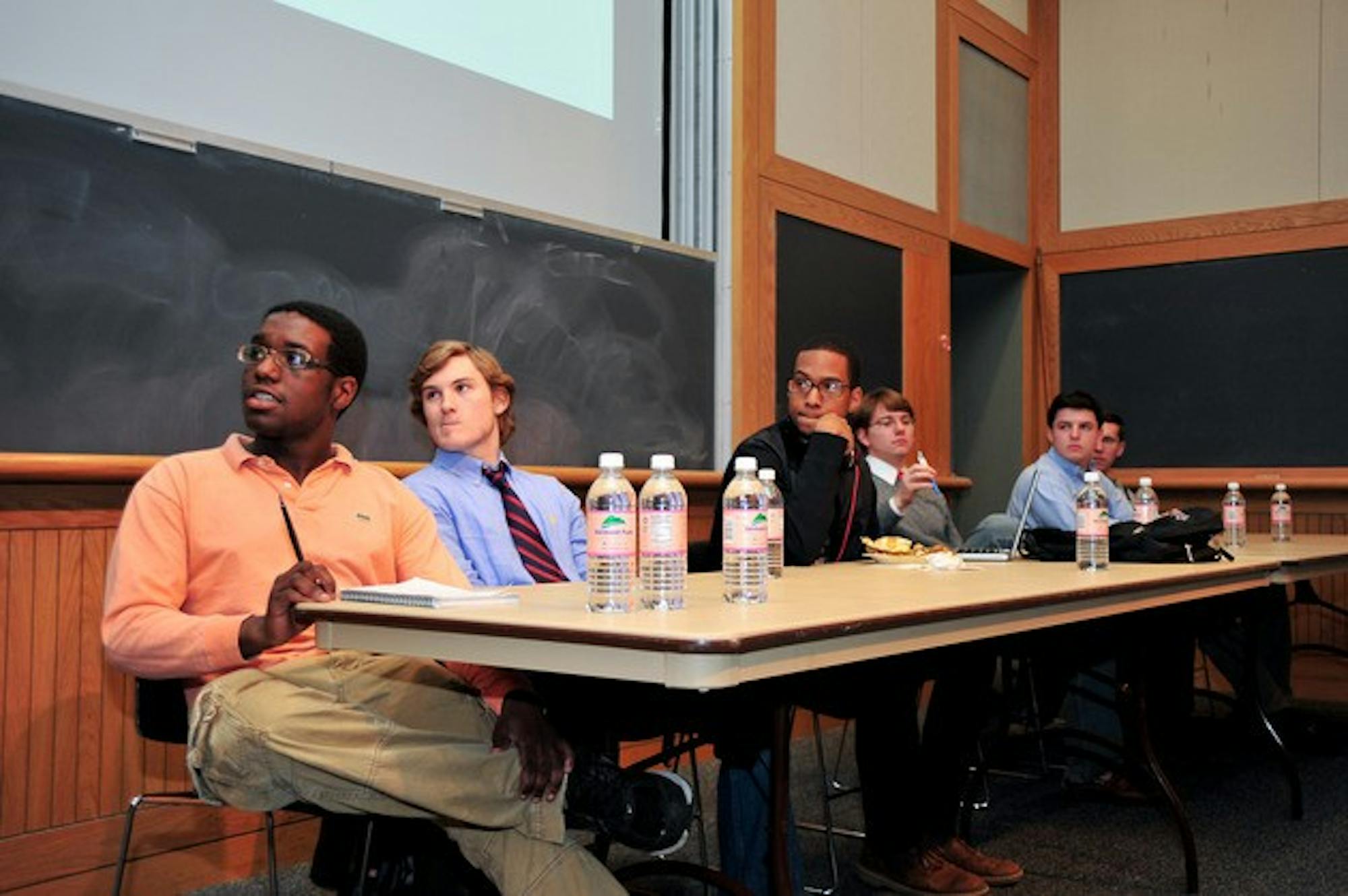The six debaters expected the wide range of questions from the debate's moderator, government professor Deborah Brooks, according to College Republicans president J.P. Harrington '14.
"While we wanted to have some focus on domestic issues, we also wanted to keep the potential discussion topics free," Harrington said. "A lot of what we see in debates is the same questions pulled from the headlines, and we wanted questions that deviated from the norm, as well as questions with a long-term perspective that we wouldn't be able to think of ourselves."
Three members from each group debated the issues, with disagreements occasionally arising from within parties. Harrington, Will Baird '15 and Jonathan Pedde '14 represented the College Republicans, while Ryan McWilliams '14, Mason Cole '13 and Chris Clark '14 participated for the College Democrats.
"We wanted to allow every person to say their own views and not just parrot national figures," Harrington said. "We aimed for a more casual style rather than just repeating party lines."
Brooks posed several questions to each group separately, allowing debaters three minutes to respond and one minute for the opposition's rebuttal. Brooks also deviated from the traditional format by posing three questions for which both groups were allowed three minutes to respond.
Brooks asked the College Democrats and College Republicans to state the three most pressing problems the United States faces today. While both groups agreed on the need to address rising unemployment and a growing national deficit, debaters were divided on the importance of handling foreign engagements. Republican debaters emphasized ongoing engagements in Iraq and Afghanistan, but domestic issues took precedence for the Democrats.
"Foreign policy means nothing if we can't get our own house in order," Cole said. "We see America lagging behind, and that is the thing that American citizens care about. Our standing in the international community requires us to be able to provide for our citizenry before we engage."
On the question of entitlement programs, Harrington rejected the possibility of eliminating social security, suggesting instead to put the program "on a diet." He proposed tying the retirement age to the current life expectancy and spoke of the need to extend the tax cuts instituted under former President George W. Bush.
Disagreement arose when the College Republicans suggested that tax cuts for the wealthy were necessary because members of the upper class were the people responsible for job creation. This statement was "too general" to hold true, Clark said.
"If I make more than $250,000 a year, I could be a doctor with no interest in creating small businesses," he said. "That's not the way to target tax cuts to make jobs. President Obama's [American Jobs Act] presents a more focused way to create jobs for small businesses."
When Brooks asked whether eliminating foreign aid would alleviate the current economic situation, both groups agreed that it was a "non-issue" in terms of the overall budget.
"Foreign aid amounts to less than 1 percent of the budget," Harrington said. "There is currently an increased national willingness to make budget cuts, and we would be wasting an incredibly amount of political capital if we didn't look to things that have not been cut in the past, like waste in the military and in social services."
Brooks broke from the debate structure to express approval for both sides' acknowledgment that foreign aid makes up a miniscule fraction of the United States budget.
"I want to commend our debaters, because 60 percent of Americans think that foreign aid is at least 10 percent of our budget," she said. "This is highly disturbing to those of us who study public opinion."
Brooks asked the debaters to discuss the legitimacy of the Citizens United Supreme Court case, which prohibits the government from censoring campaign ads funded by corporations or unions. Cole criticized the Supreme Court's decision, arguing that "elections should be for the people, not just for the people who have money." Harrington argued that the decision was justified based on legal precedent.
"If you go back in constitutional history, corporations have always legally been individuals," Harrington said. "If you don't like the Citizens United decision, you will need a constitutional amendment to declare that corporations are not citizens under the First Amendment."
The debaters discussed the current situations in Libya and Iran as two of the most pressing issues in foreign policy. Both sides expressed caution about declaring American intervention in Libya a success so soon after Moammar Gadhafi's death.
"I don't believe in standing behind the Mission Accomplished' banner quite yet," Cole said. "But the College Democrats are in favor of helping those facing humanitarian conflicts, and we're very proud of the bipartisan decision to help revolution occur under a dictator who treated his people poorly."
Harrington said President Barack Obama approach to the intervention in Libya was a questionable interpretation of "constitutional law" and was encouraged by the "rather clean" way in which the situation unfolded.
"We'll know more about this in the future if we made the right decision to go in," Harrington said. "We essentially created a power vacuum and in that sense it may have been irresponsible if it results in a new dictator or theocratic state coming to power."
Brooks asked the two groups to consider a scenario in which Sen. John McCain, R-Ariz., had been elected in 2008 instead of Obama. McWilliams said McCain would have continued the economic policies of the Bush administration that "included massive tax cuts for the upper class and allowed job growth to remain stagnant." The McCain administration would not have been able to improve health care coverage in the same way the Obama administration has, according to Clark.
Harrington agreed that "Obamacare" would not have passed under McCain, but argued that this scenario would have been "great for this country."
Pedde is a member of The Dartmouth Staff.




